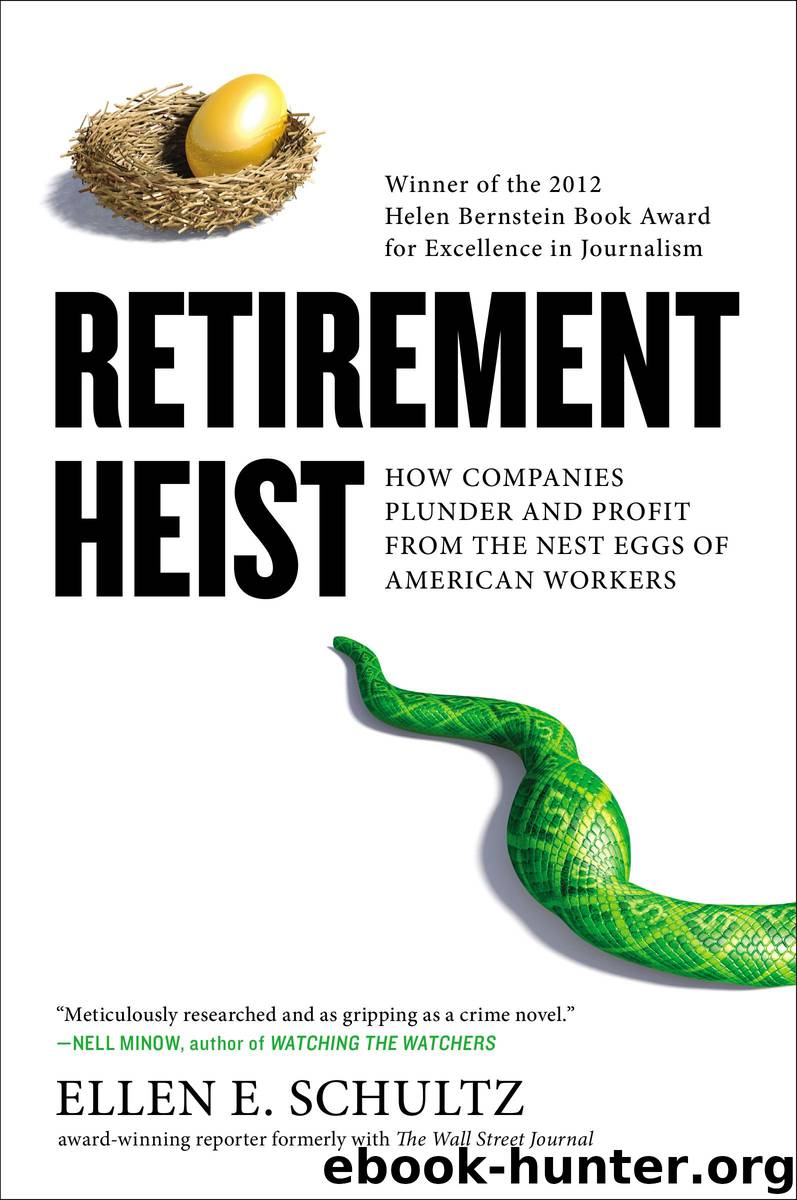Retirement Heist by Ellen E. Schultz

Author:Ellen E. Schultz
Language: eng
Format: epub, mobi
Publisher: Penguin Group
Published: 2011-09-01T04:00:00+00:00
AN INSURABLE INTEREST
Over time, life insurance began morphing from a tax shelter into a finance tool for executive pay. For decades, if an individual or company wanted to buy life insurance on someone, they had to have an “insurable interest in the person,” that is, the beneficiary of the policy would be directly affected by the insured’s death. This rule existed for obvious reasons: Without it, a person could buy life insurance on a stranger—say, a skydiver, race car driver, or coal miner—and profit from his demise. And if he didn’t die soon enough, the policyholder would have an incentive to push him over a cliff.
Initially, companies bought policies to protect them from the deaths of certain executives, or “key” employees. It made sense for partners in law and accounting firms to buy life insurance on each other. But, encouraged by insurance brokers, companies began buying it on broad swaths of their employees, because by insuring thousands of employees, not just “key men,” the companies can place greater sums in life insurance contracts.
Dow Chemical, the Midland, Michigan, company known for its manufacturing of napalm, breast implants, and Agent Orange, was initially skeptical. An internal memo noted that, except for top-paid executives, it was “doubtful that Dow has an insurable interest in any of its employees.” But it overcame its qualms and by 1992 had purchased life insurance policies on more than 20,000 employees.
Congress had no idea how widespread this practice had become until someone ratted on them. In 1995, a brown envelope was left on the desk of Ken Kies, chief of staff at the Joint Tax Committee. The envelope contained a list of companies that had bought life insurance on employees—along with calculations showing that a company might take in $1.2 billion over ten years by insuring 50,000 of its employees. It also noted that from 1993 to 1995, Wal-Mart had taken out insurance on 350,000 workers.
Lawmakers did the math and were appalled. They weren’t concerned about whether Wal-Mart had an insurable interest in its stock clerks and store greeters, but they did care a lot about the loss of tax revenue. Companies were borrowing money from the policies and deducting the interest. The IRS deemed that the leveraged COLI taken out by seven hundred companies were sham transactions with no business purpose other than to score tax breaks. It filed a flurry of tax court cases, and companies subsequently took big charges for the disallowed deductions for interest on policy loans; among them were American Greetings, the Brooklyn, Ohio, maker of Tender Thoughts brand greeting cards and owner of Holly Hobbie and Care Bears licenses, and W.R. Grace, the Columbia, Maryland, manufacturer of building materials, which took out life insurance on its workers while defending thousands of asbestos-related lawsuits.
Within minutes of the interest-deduction phase-out, companies found a way around it. Instead of borrowing money from insurance companies, they simply borrowed it elsewhere. This was called “indirect leverage.” The practice was especially appealing to banks, which can borrow money cheaply.
Download
This site does not store any files on its server. We only index and link to content provided by other sites. Please contact the content providers to delete copyright contents if any and email us, we'll remove relevant links or contents immediately.
| Anthropology | Archaeology |
| Philosophy | Politics & Government |
| Social Sciences | Sociology |
| Women's Studies |
The Secret History by Donna Tartt(16606)
The Social Justice Warrior Handbook by Lisa De Pasquale(11485)
Thirteen Reasons Why by Jay Asher(7780)
This Is How You Lose Her by Junot Diaz(5753)
Weapons of Math Destruction by Cathy O'Neil(5029)
Zero to One by Peter Thiel(4816)
The Myth of the Strong Leader by Archie Brown(4785)
Promise Me, Dad by Joe Biden(4440)
Stone's Rules by Roger Stone(4412)
Beartown by Fredrik Backman(4403)
How Democracies Die by Steven Levitsky & Daniel Ziblatt(4392)
The Fire Next Time by James Baldwin(4336)
100 Deadly Skills by Clint Emerson(4070)
A Higher Loyalty: Truth, Lies, and Leadership by James Comey(4024)
Rise and Kill First by Ronen Bergman(4008)
The David Icke Guide to the Global Conspiracy (and how to end it) by David Icke(3875)
The Farm by Tom Rob Smith(3869)
Secrecy World by Jake Bernstein(3773)
The Doomsday Machine by Daniel Ellsberg(3725)
